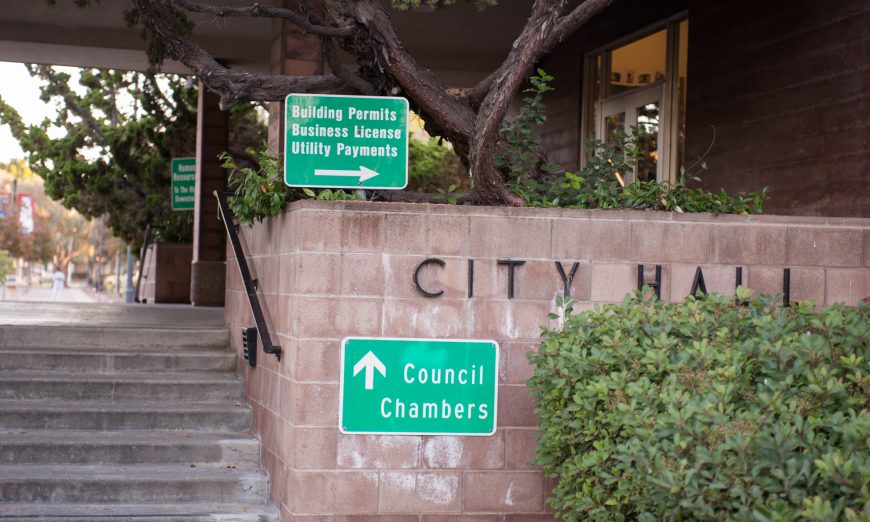Members of the Santa Clara City Council frequently speak of public trust. Toward that end, they cite transparency as the best avenue to achieve that goal.
Mayor Lisa Gillmor and Council Member Kathy Watanabe wrote about public trust in an editorial criticizing the original bond measure set to appear on the November ballot. They took issue with how they believed the measure would empower city employees to manage the money levied from the bond.
They wanted more transparency. The public deserves it, they wrote.
Meanwhile, city employees and council members regularly stonewall media outlets seeking information in the public interest. Never has any council member taken issue — at least not publicly — with how city employees handle records requests or their colleagues’ failure to produce supposedly public records.
The Gatekeepers
Requests for public information go through two channels at city hall.
The first is the city’s spokesperson Janine De la Vega, whose title is “public information officer.” The second is by submitting a public records request, which goes through the city clerk’s office.
However, both avenues’ record on answering straightforward requests for supposedly publicly available information in plain language is dismal. Both often hide behind privacy statutes and infuse responses with bureaucratic gobbledygook.
For instance, during the July 10 council meeting, sources reported a kerfuffle between Vice Mayor Anthony Becker’s husband and Gillmor’s special advisor, Kirk Vartan.
Whether the Santa Clara Police Department has an officer stationed at city hall remains unclear. However, the video shows an officer arriving in the council chambers mere minutes after the supposed incident.
The Weekly requested records for calls for service to city hall as well as text messages between Gillmor and City Manager Jovan Grogan. City employees met this simple request for information with obstinance.
A city employee, in fluent bureaucratese, wrote the information was “… protected under the deliberative process privilege as these records contain public safety concerns and determining the appropriate response to said concerns are pre-decisional deliberations, and there is a valid concern that by making such deliberations public, we may hinder or discourage such reporting of concerns in the future.”
The city followed that up with another reply that it had no responsive records.
Subtextually, with such a response, the city is telling its citizens it is not entitled to know what its police force is up to — which is the antithesis of transparent.
Blotting out the Record
And it isn’t just city hall. The Santa Clara Police Department (SCPD) used to publish a police blotter, which details, in addition to other things, calls for service.
According to the SCPD website, “[u]nder State and Federal Freedom of Information Laws, law enforcement agencies are required to keep a record of daily activities that can be inspected by the public.”
However, SCPD has not updated the blotter since July 2021.
While the site acknowledges that the law requires the department to keep such a log, according to its site, SCPD does not see updating the public on its activity as “an essential service” and will only make the blotter available “as staffing sources are available.”
Since 2021, SCPD has begun publishing an arrest log. The site reads that the department will update the log, which only includes arrests, “weekly.” However, even that log is only updated monthly, and the logs are deleted after a month.
Doublespeak
Independent of state or federal law, the city’s records retention policy requires city employees and politicians to keep most records, which include text messages and emails, for two years, De la Vega wrote in an email inquiring about the policy. These correspondences are considered public record.
Also, she wrote, personal devices are not exempt, meaning that council members cannot evade the rules by using a personal email or cell phone if they are discussing city business.
In practice, however, the policy is infused with enough intentionally ambiguous language to allow city employees to liberally interpret the meaning and evade turning over correspondence.
According to the city’s policy, when city employees receive a records request, they conduct a “reasonable calculated” search. Further, the policy states, “privacy concerns” are to be addressed on a “case-by-case basis.” Communications that are “primarily personal” and contain only “incidental mentions” of city business are “generally” exempt.
Similar vagueness in the city’s calendaring ordinance also pays lip service to the idea of transparency while allowing the city to dodge turning over anything of value to the public. That ordinance, adopted in 2016 and published monthly, supposedly requires council members to list any meetings whose content relates to city business.
Demonstrating the city’s unwillingness to disclose even basic information, a records request about a meeting between lobbyist Jude Barry, Gillmor and council candidate Kelly Cox returned nothing useful. It simply lists that the trio met. The single sheet the city provided only lists those in attendance with “Related Santa Clara update” as the subject.

There is no detail as to the hour-and-a-half meeting’s content, not even its location.
The Paper Chase
In 2022, The Weekly tried to understand why the diversity, equity and inclusion task force — seemingly out of the blue — urged the council to maintain the police chief’s elected status. After the task force failed to post an agenda or minutes for its meeting prior to that recommendation in September 2021, The Weekly submitted a records request.
Responding to that request, the city again hid behind “deliberative process.” To justify withholding emails between the task force and council members, city employees wrote that such correspondence is “not retained by the City in the ordinary course of business.”
Later in 2022, The Weekly wanted to understand how Watanabe got her hands on a binder full of notes from a 2013 closed session about Super Bowl 50. Despite not being on the council until 2016, Watanabe claimed she “found” the binder, chalked full of notes penned by former Council Member Teresa O’Neill, in her office.
Watanabe’s office not being O’Neill’s former office made the claim more dubious.
Throwing everything at the wall to see what would stick, the city blocked the records becoming public. Its response claimed that the records were “personnel, medical or similar records, the disclosure of which would constitute an unwarranted invasion of personal privacy.”
Then, when pressed for explanation, it claimed that they were “protected by the attorney-client privilege and/or attorney work-product privilege. Finally, the records were suddenly “protected by closed session confidentiality.”
Gone but not Forgotten
Whether council members are even aware that they are supposed to keep such records is unclear.
In late 2021, while reporting on NextDoor’s policy regarding political discourse, The Weekly sent text messages to Watanabe, a lead for her neighborhood on the site, asking for a comment. She didn’t respond.
Then, in April 2022, while reporting on strife surrounding the city’s BMX track, The Weekly again sent text messages to Watanabe, who is the liaison for the Police Athletic League (PAL), the track’s former operator, asking for a comment. She declined, but her response indicated she deleted previous messages.
“Who is this please?” she wrote back.


When confronted with whether she could see the text log from previous exchanges, Watanabe ignored the comment.
Finally, while working on a follow-up to the NextDoor story, The Weekly again text messaged Watanabe, again asking for comment, and, again, she replied “Who is this please?” The Weekly questioned whether Watanabe could see the text log — again.
“Nope. Sorry,” she wrote. “I will be deleting this too.”
The Weekly then asked her whether she was aware of the city’s records retention policy. She never responded.
The Best Disinfectant
Justice Louis Brandeis once famously wrote that sunshine is the best disinfectant. Corruption thrives in the dark corners of government, and Brandeis knew that.
In her email, De la Vega wrote that the city’s governance and ethics committee has an item on its work-plan to “explore options on retention of text messages on City owned devices.” City employees will return to the committee with an informational report pertaining to text messages and its retention policy at a “future” meeting, she wrote.
But, whether that committee aims to address the lack of teeth for enforcement of the rules is ambiguous.
When asked about consequences for council members who fail to comply with the city’s, or state’s, rules regarding records retention, De la Vega wrote that “it is expected that our employees and elected officials adhere to our policies and regulations.” She then added that failure to comply “can” result in the person requesting information getting a judge involved.
In other words, unless someone is prepared to escalate the matter to the courts, there seems to be no consequences for the city, or council member, who fails to act transparently. Such policies are more akin to tort law, not sunshine law.
If the council truly believes transparency is the best path to public trust, maybe its members should increase access to city hall instead of waiting for a judge to slap them on the wrist. The public will thank them.







You just can’t make this stuff up. I’m surprised Kathy didn’t accuse you of “harassing her” for texting her too much. Bahhaaa haha
General public, staff are too scared to speak out against these two.
Retaliation is real. nothing is said on the record.
A case of destroy the opposition, beat them down, take them to court, lie, manipulate, create suspicious, manufacture stories, all to be the keep the keys to the city.
Feudalism in Santa Clara is alive and well.
Take a look at Cupertino, policy started in 2023 forbids council members from even making a Public Records request! Everything they are told is crafted by staff.